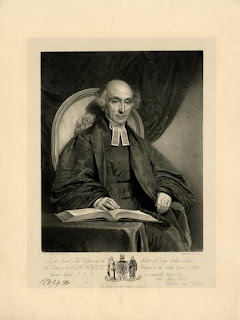"All that is essential in them": Jelf's Bampton Lectures on the ordinances of Matrimony, Confirmation, and Visitation of the Sick
Matrimony
The holy estate of Matrimony is so highly esteemed amongst us as to be considered compatible with the highest spiritual functions of God's ordained servants, sanctified as it is as a type of the mystery of Christ's union with the Church. Yet, as respects the rite by which it is solemnized, Cardinal Bellarmine himself has signally failed in the attempt to prove it a Sacrament; and, in its own nature, matrimony is no more a means of grace, than any other innocent state of life may be; just as indifferent in its essence as a state of celibacy, or a state of riches, or a state of poverty; capable of being turned, by God's grace, to holy uses, yet to one man a snare, and to another a blessing; not a means of grace, but furnishing an occasion for Christian dispositions, and holy union in the Lord.
Confirmation
The imposition of the Bishop's hands, accompanied with solemn prayer, has ever been by the whole Catholic Church accepted as a means of grace; the germ of it, to say the least, being plainly discoverable in Scripture, and the universal observance of it, with some modifications, from the very earliest times, being sufficient warrant for considering it an [quoting Hooker] "Ordinance Apostolic, always profitable in God's Church, although not always accompanied with equal largeness of those external effects, which gave it countenance at the first".
Extreme Unction
There is no sufficient evidence prior to that of Innocentius in the fifth century, that it was customary in the Church - indeed the Epistle of that Pope to Decentiust furnishes a presumptive proof against the early institution of any rite of Unction of the sick, apart from its use as an instrument concurrent with the miraculous gifts of healing ... that the ancient Church interpreted the passage in St. James's Epistle as we do, attributing to the application of oil "in the name of the Lord," not a function which was to be perpetuated in the Church as a Sacrament for the spiritual benefit of the dying, when despaired of, but an efficacy, conjointly with prayer, towards the miraculous restoration of the sick man's bodily health; to which was added, in certain cases, the forgiveness of sins as comprised in the miracle. On these grounds, our Church, in her discretion, has rightly thought fit to discontinue the anointing, while she retains, however, that which St. James himself has declared to be instrumental to saving "the sick," namely "the prayer of faith," supplicating conditionally for the sick member's restoration to bodily health, and commending his soul at the point of departure, "as into the hands of a faithful Creator".
In his affirmation of the grace bestowed through the Prayer Book rites of Matrimony, Confirmation, and Visitation of the Sick, without any need to define these rites as Sacraments, Jelf is emphasising the gift and reality of the Prayer Book order:
The real question is, which ordinances, as to all that is essential in them, she has retained, not what name she assigns them; for if there is any grace conveyed through them, we enjoy it by virtue of God's blessing on their use, not by virtue of an equivocal name.
His account of the rites of Orders, Matrimony, Confirmation, and Visitation of the Sick closely follows Cosin's understanding of these Prayer Book rites as means of grace from which nothing is lacking by the refusal to accord them as Sacraments of the Gospel:
in the confirmation of those persons that are to be strengthened in their Christian Faith, by prayer and imposition of hands, according to the examples of the holy Apostles and ancient Bishops of the Catholic Church; in the public and solemn benediction of persons that are to be joined together in holy matrimony ... in the consecrating of Bishops, and the ordaining of Priests and Deacons, for the service of God in His Church by a lawful succession; and in visiting the sick, by praying for them, and administering the blessed Sacrament to them, together with a final absolution of them from their repented sins.




Comments
Post a Comment